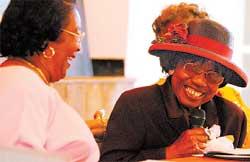Before the start of the 20th century, Bahamian immigrant Mariah Brown worked at the Peacock Inn in Coconut Grove — dreaming of building the home that today is the oldest black-owned house in Miami-Dade County.
Sunday afternoon, on the first day of weeklong festivities honoring Bahamian culture in South Florida, actress Laverne Lewis brought Brown back to life for a group that included some of the area’s living pioneers.
 Lewis performed a monologue as Brown on Sunday afternoon at the Christ Episcopal Church, 3841 Hibiscus St., dropping names of other South Florida pioneers such as Julia Tuttle and the man she called “Mr. Henry” — railroad pioneer Henry Flagler.
Lewis performed a monologue as Brown on Sunday afternoon at the Christ Episcopal Church, 3841 Hibiscus St., dropping names of other South Florida pioneers such as Julia Tuttle and the man she called “Mr. Henry” — railroad pioneer Henry Flagler.
PIONEER SPIRIT: Lois Jennings, left, and Arlene Broxton share a laugh at the ‘Pioneers’ Tea and Oral History Day’ Sunday afternoon at Christ Episcopal Church in Coconut Grove. Photo By Michael Strader Marko/For The Herald
‘Settlers always be helpin’ each other,” Lewis said, mimicking Brown’s Bahamian speech. “If it be the same way a hundred years from now, Coconut Grove be a fine place to be.”
The performance was part of the ‘Pioneers’ Tea and Oral History Day,” the first event leading up to the annual Goombay festival, a landmark annual Bahamian celebration saluting the African-Bahamian heritage and the islands’ influence in South Florida.
While Flagler and Tuttle are among the area’s most prominent pioneers, Bahamian immigrants also played a key role in the development of South Florida, helping to build Flagler’s railroad.
Before Lewis’ performance, five Grove pioneer women took the audience on a trip in time — back to the days when their neighborhood was called “Black Town.”
“There wasn’t a single person in this town I didn’t know,” said Lois Jennings, a retired teacher. “You better not go down the street misbehaving, because you would get it.”
Each of the panelists shared the view that today’s Coconut Grove lacks some of the values with which they were brought up.
Past events gradually had been assimilated into the American mainstream, until last year, when the Bahamian tourism office stepped up sponsorship efforts. As a result, the original flavor of the Bahamian festival was restored, raising attendance at the same time.
Rosie Gomez, manager of the Bahamas Ministry of Tourism in Miami, said her office will be sending vendors food and clothing vendors, musicians, dancers and other artists to the Goombay Street festival scheduled to begin Saturday in Miami’s Coconut Grove district.
Other events preceding the street festival begin Tuesday, including a comedy show and cocktail parties.
“This is the 30th anniversary of Bahamian independence, so we want the festival to have the settings of a Bahamian village,” Gomez said.
Gomez was at the event Sunday where organizers outlined Bahamian-American history.
The festival is the largest Bahamian-American heritage event in the United States. Tens of thousands of people are expected to attend the 27th annual celebration of Bahamian culture.
By Daphne Duret, The Miami Herald



